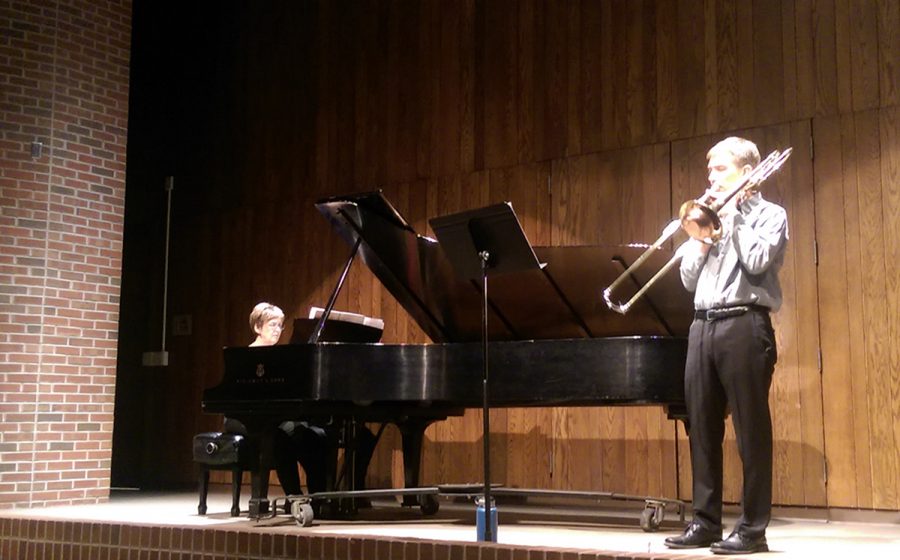Faculty recital shows the bond of two musicians
Trombonist and pianist collaborating again, adding to their decade of work together
More stories from Elizabeth Gosling
Photo by Elizabeth Gosling
Phil Ostrander and Barbara Young performed together for Ostrander’s recital Sunday. Music faculty normally hold one recital per year.
After ten years of playing together, trombonist Phil Ostrander and pianist Barbara Young performed yet again for a faculty recital Sunday, Jan. 29.
Faculty from the music department typically hold only one recital per year because of their busy schedules. Ostrander, who conducts the Symphony Band in addition to giving trombone lessons, leading the trombone choir and playing professionally, said it takes about six months to prepare for recitals.
“We have a regular teaching load, just like any other professor, and I also have to practice, at a minimum, an hour a day,” Ostrander said.
During the recital, Ostrander and Young performed three pieces together and Ostrander finished the performance with two jazz pieces, alongside pianist Josh Gallagher.
The first piece, entitled “Vocalises-Melodiques,” composed by Henri Busser, along with the second composition “Variations in F# Minor, Op. 24,” were written by composers from France and Belgium, respectively. The second set of songs were all American-based, including work from a Wisconsin-based composer, David Biedenbender from Waukesha.
Gloria Dorschner, a sophomore music education student, said she enjoyed the concert and seeing faculty perform is inspiring.
Whenever instrumentalists have a recital, piano accompanies the instrumentalist. Ostrander said most of the solo repertoire is written for the specific instrument and a piano. With that being said, the recital featured Ostrander; however, he cannot play without the piano.
“More often than not, pianists do not collaborate when they do solo recitals,” Ostrander said.
The trombonist chose his pieces based on the music he wanted to play in his life, and after playing through songs and hearing their sounds, he decided on his best pieces to perform for the recital. Ostrander said he wants to play works that he has not previously, so it is very rare when he brings back a piece.
No matter what piece they perform, there lies a bigger reason in why the duo does music in the first place.
Young said she sometimes feels as though the piano is all she would ever want as a career.
“I sort of think I am a better person because I am a musician, but I don’t know exactly why that is,” Young said. “You learn to value your work, but not necessarily to value yourself because you are good at something, because there is usually someone else who is better.”
Ostrander said he enjoys the social element of music. It has the power of talking without words, he said, which is very powerful to him. He said he firmly believes people should play music because of the love they have for it.
Practice, get lessons and pursue music in your own way, he said.
“I don’t know anything else in the world you can do with anywhere from two to 100 people,” Ostrander said, “where you can all communicate together without speaking.”


